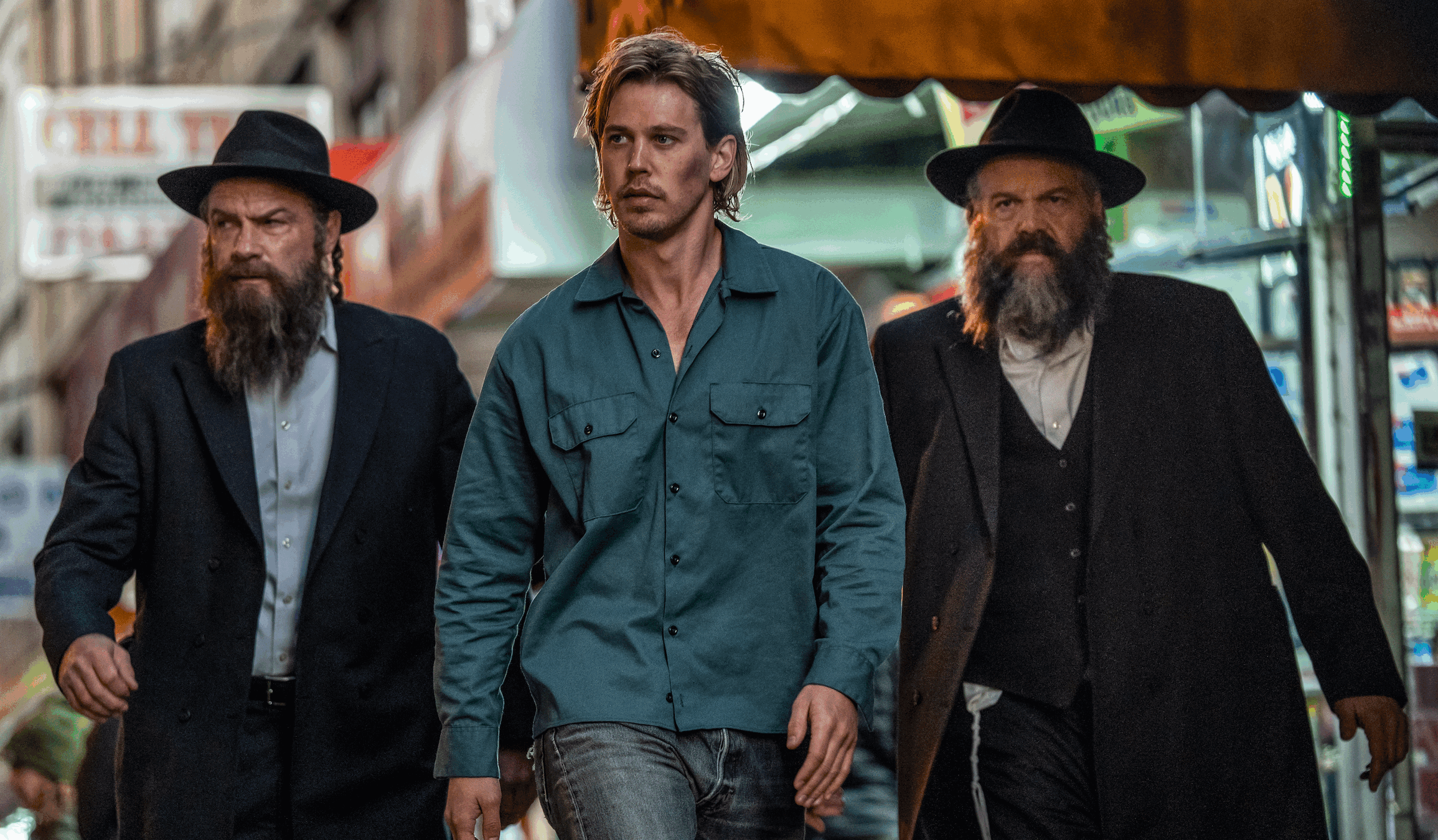‘Caught Stealing’ gives us tough, Hasidic drug lords — is it good for the Jews?
Darren Aronofsky’s nostalgic crime caper packs heat and Yiddish

Liev Schreiber, Austin Butler and Vincent D’Onofrio in Caught Stealing. Photo by Niko Tavernise
Darren Aronofsky’s most formative encounter with Haredi Jews may have come when he was an 18-year-old in Israel at the Kotel. It was there at the wall, he told film journalist Andrea Chase, he met a group of Hasidim who introduced him to the Jewish mysticism he’d go on to use to award-winning effect in his debut feature, Pi.
The Hasids in that film were concerned with gematria and ushering in the Messianic age. Caught Stealing, the director’s latest and easily his most fun, shows another face of the vibrant community: affable, frightening, well-armed brothers who drive a wood-paneled minivan, love their Bubbe and are on the make as drug lords.
Good for the Jews? Eh.
Set in the gentrifying Giuliani murk of 1998 and stretching across three boroughs — Alphabet City is home base — Caught Stealing is Aronofsky’s love letter to his hometown, stuffed with tributes to bygone establishments like Kim’s Video, cameos by WFAN’s Mike Francesa and an ethnic patchwork that gives observant Jews a central role.
“The Hebrews,” Shmully (Vincent D’Onofrio) and Lipa (Liev Schreiber, who’s been on a Jewish kick at least since Everything is Illuminated) replace the cowboy duo in Charlie Huston’s novel, which Huston adapted himself. One suspects the change owes to Aronofsky’s enduring interest in Yiddishkeit.
Laden with peyos and packing heat, the pair chat in Yiddish when debating whether or not to inflict various forms of bodily harm on our protagonist, Hank (Austin Butler), while he’s in their presence — just like some Jewish parents would deploy the mamoloshen when discussing something adult when the kinderlach can hear.
Their subtitles are in blue — red here is reserved for Russian, yellow for Spanish. Motl Didner, associate artistic director of the National Yiddish Theatre Folksbiene, was the Yiddish advisor.
How did Hank, a country boy bartender and would-be baseball star from California, end up with these Hasids? It’s an urban misadventure in catsitting that makes Inside Llewyn Davis‘ seem grounded.
Agreeing to watch the Siberian forest cat of his neighbor, Russ (Matt Smith in full mohawk as a wanker punk rocker), Hank ends up with custody of way more than he bargained for in illicit goods. An NYPD Detective, Roman (Regina King), visits Hank after Russian mobsters rupture his kidney, to warn him to be on the lookout for two men in tallises, who she calls “scary monsters.”
Nu?
If calling Jews monsters rings alarm bells, consider how Aronofsky — who in interviews seems to relish the depiction of landsmen who are “a bunch of badass motherfuckers,” and whose father was a science teacher at a yeshiva in Flatbush — paints the other cultures in this neo-noir.
A diminutive Russian gang member named Molecule has a Gorbachev port-wine stain and a sub-Yakov-Smirnoff-level understanding of American idiom. Colorado (played by Bad Bunny) threatens Hank with a garishly-decorated “pistola.” Together this melting pot, in a kind of encore to Aronofsky’s The Wrestler, do awful things with staples and our hero’s body.
When it comes to our Hebrews, as pre-spoiled by the trailer, we get a heymish sequence of their family life, giving Hester Street star Carol Kane a shot to revisit her Yiddish as Shmully and Lipa’s adoring Bubbe. Our archivist Chana Pollack called her work here “insanely on point” and appropriately Old World.
If you can’t quite smell the challah in the pre-Shabbos scene, you can nearly feel the static of the plastic cover on the tablecloth and sense the second sink out of frame in the kitchen. (Daniel Finkelman, a Lubavitcher filmmaker who produced Menashe and The Vigil, is credited as an advisor.)
Bubbe offers proverbs like “tsores zenen far dem mentshn vi zhaver far ayzn” (“troubles are to man what rust is to iron”) and urges Hank to fill up on matzo ball soup. The brothers promise to return for kiddush after completing a mission that involves a detour to a gaudy Russian wedding venue and a lot of grenades. Hank, as a gentile, will be the wheelman so they don’t break Shabbat and further anger Hashem.
Devout and firmly of the diaspora, The Hebrews are a model of muscular Judaism Max Nordau never saw coming.
Most filmgoers, even those who saw the trailer for Guns & Moses or remember The Hebrew Hammer, don’t think of the Orthodox as particularly intimidating. (Sadly, many visible Jews in New York and elsewhere are targeted in attacks on the street.) D’Onofrio and Schreiber are happy to subvert a stereotype, even if their behavior is far from kosher, and at times villainous.
Is it perfect representation in a time of growing antisemitism? No.
But to quote a lament of Lipa’s, it’s a “broken world.” This, a central concept in our tradition, is perhaps the thesis of Aronofsky’s entire filmography

















